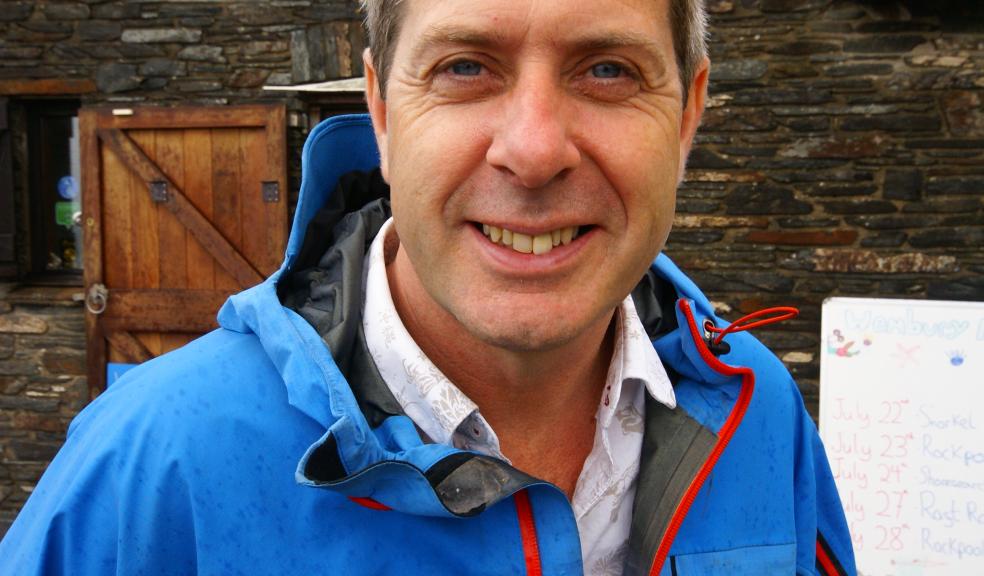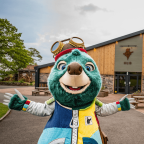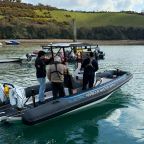
Prof Iain Stewart revealed as Devon Wildlife Trust’s new president
Plymouth University academic and TV geologist Professor Iain Stewart MBE has been revealed as the new president of top local conservation charity Devon Wildlife Trust.
Prof Stewart is only the third person to take on the honorary role since the conservation charity was founded 55 years ago in 1962. His appointment was made after a unanimous decision by
Devon Wildlife Trust’s 15 strong Board of Trustees. He succeeds Prof Ian Mercer CBE, the eminent conservationist who had held the position from 1985 until his death in September 2016.
Prof Stewart spent a recent visit to Devon Wildlife Trust’s Wembury Marine Centre finding out about the work the charity does for local people and nature. Prof Stewart spoke of his new role as The Trust’s president:
“It’s a tremendously exciting opportunity. Wildlife conservation is fresh territory for me and it’s going to be a big learning curve, but it will allow me to indulge myself in all the things I loved as a kid – the natural world and a sense of adventure.
I thought a lot about whether to take this role up with Devon Wildlife Trust. I said yes because the charity is local to me. They are right in my neighbourhood. But I also said yes because for a lot of people wildlife is an entry point to something much bigger. There’s an overlap between people who are interested in wildlife and issues in my working world such as climate change.”
The geologist, who is Director of the Sustainable Earth Institute at Plymouth University’s School of Geography, Earth and Environmental Sciences, joined pupils from Coombe Dean Secondary School, Plymouth on a guided rockpool safari to discover the wildlife which lives in Wembury’s many tidal pools. Among the group’s finds were shore crabs, pipe fish and cushion stars. Prof Stewart said:
“Spending time with these young people you can see there’s loads of energy, it’s just buzzing. One of the best things about this kind of event is that it provides really simple excitement from being outdoors and exploring nature. It’s the kind of thing I did as a child and I also did it with my kids on this very beach. You get the sense that the children here today don’t think they are learning science, they are just having fun, which is fantastic.
Devon Wildlife Trust is an exemplar as to how you can combine good science and a passionate membership, with effective decision making. I’m proud that I am now to be a part of it.”
Devon Wildlife Trust’s Chair, Dr Peta Foxall, joined Prof Stewart on his visit and welcomed the news of the appointment. She said: "I am delighted that Iain has accepted the Board’s invitation to become President of Devon Wildlife Trust. Iain’s knowledge and expertise as a geologist and his infectious enthusiasm for the subject means that he will be a great ambassador for the work of the Trust.”
Harry Barton, Devon Wildlife Trust’s Chief Executive, spoke of the role Prof Iain Stewart would now take up. He said: “I’m absolutely delighted about Iain’s appointment, as I am sure will be our 31,000 members and our many other supporters. Iain is a brilliant communicator and has turned audiences on to geology all over the world through his TV series, such as How Earth Made Us. I have no doubt that he will be a wonderful advocate for our work too.
"Wildlife and wild places remain Devon’s best assets but they face some serious pressures today. I’m so pleased that Iain has agreed to become our president and help us champion their cause.”
Prof Stewart was born in East Kilbride, Scotland and studied geography and geology at Strathclyde University. He came to Devon in 2004 to take up a teaching and research post at Plymouth University. He was later appointed Professor of Geoscience Communication, believed to be the first position of its type in the world.
He lives in Plymouth with his partner Paola and two teenage daughters. In a profile piece with the Sunday Telegraph in 2010 Prof Stewart described his favourite Devon haunts as Dartmoor, the waterfalls at Lydford Gorge and the county’s wonderful beaches.











